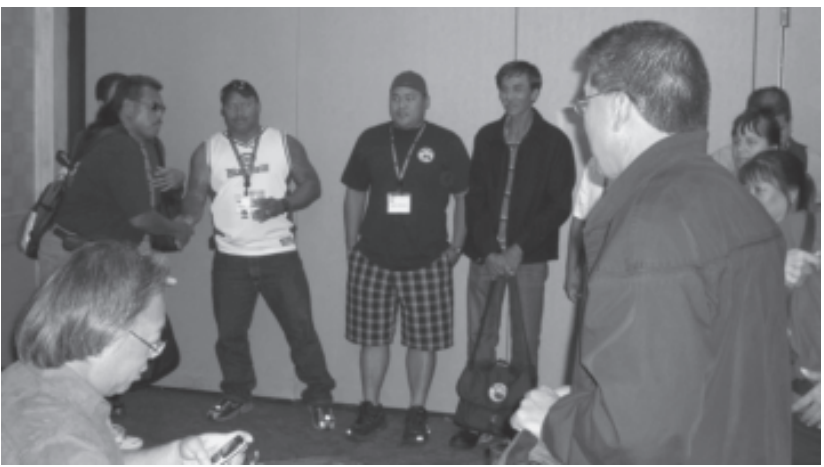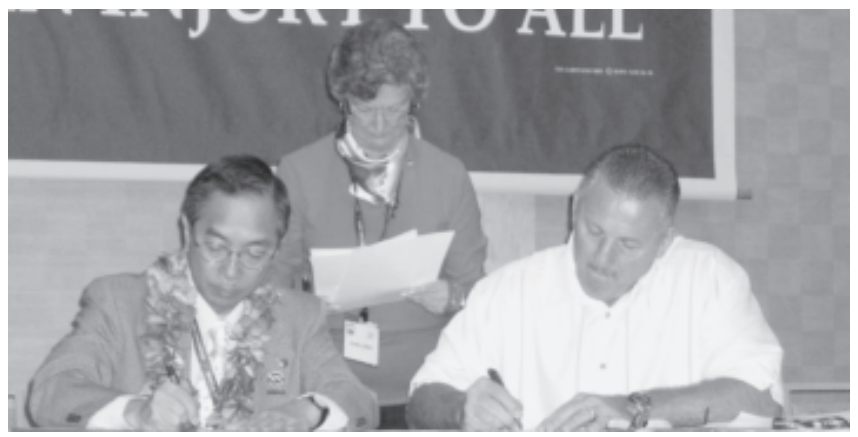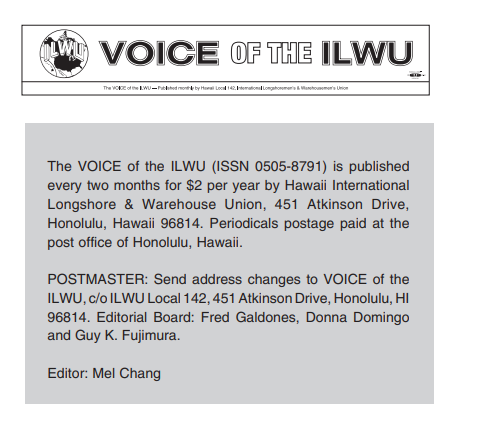ILWU democracy is unique among American unions in that rank-and-file members make the policies that direct the work of their International union. They do this once every three years at a five-day Convention which was held this year in Seattle, Washington from June 8 - 12, 2009.
The ILWU Convention rotates to one of the seven areas of the ILWU every three years. The last Convention was held in 2006 in Vancouver, Canada. The next Convention in 2012 will be held in Southern California. Hawaii will host the Convention in 2015. The Convention will be held in Oregon in 2018, in Northern California in 2024, and in Canada in 2024.
A total of 317 delegates attended the Convention. The delegates are elected by the members of ILWU locals in California, Oregon, Washington, Alaska, Hawaii and Canada. Local 142 Hawaii sent 117 delegates. In addition, there were 31 fraternal delegates from ILWU pensioner groups and women’s auxiliaries.
Maui Division was the largest group in Local 142 with 52 delegates. Oahu Division had 38 delegates, Hawaii Division sent 14 delegates, and Kauai had 13 delegates.
The business of the Convention kept the delegates working hard for five days and a few evenings. The Convention approved a budget for the next three years, adopted 7 constitutional amendments, 5 program policies, and 30 resolutions. All actions of the International Convention take effect upon adoption by the Convention.
Officers nominated
On June 12, the last day of the Convention, delegates nominated candidates for the union’s titled officers and executive board. International President Robert McEllrath, International Vice President, Hawaii, Wesley Furtado and International Secretary-Treasurer Willie Adams will run for re-election to their offices. Incumbent Vice President, Mainland, Joe Radisich will not seek re-election—he nominated Ray Familathe to run for International Vice President, Mainland. All four candidates are running without opposition.
The following candidates were nominated to represent Hawaii on the International Executive Board: Sam Kaaihue (Longshore grouping); Francis Kamakaokalani (General Trades grouping); Cyrus Kodani (Tourism grouping); and Aurora Raposas (Sugar grouping). Douglas Cabading and Harold Gouveia were nominated to represent the Pineapple grouping and will face a run-off election to determine the winner.
Other ILWU areas also nominated their candidates for the International Executive Board, but those candidates will not appear on the Hawaii ballot. The International Election is conducted by mail and Hawaii members should receive ballots for the International Election in July.

Local 142 members from each industrial group meet to nominate their delegate to the International Executive Board (IEB). The IEB meets three times a year and is the second highest policy making body of the International Union between the Conventions. Local 142 has 6 delegates on the IEB—one from each industrial group and the Local 142 President.
A week of hard work, unity and solidarity
On the first day of the Convention, Local 142 President Fred Galdones requested that the Convention be dedicated in memory of Ah Quon McElrath, who passed away on December 11, 2008. The delegates unanimously approved the request and stood for a moment of silence in respect for Ah Quon’s lifetime of dedication and contribution to the ILWU, the union movement, and all humanity.
International Solidarity
International solidarity was a theme repeated throughout the week. On the second day of the Convention, the ILWU and the All Japan Dockworkers Union (Zenkowan) renewed the Solidarity Agreement between the two unions.
Akinobu Itoh, President of the All Japan Dockworkers union Zenkowan, recalled the 50-year special relationship between the ILWU and Zenkowan and how both unions took action to support each other.
More recently, President Itoh took a leading role in building extraordinary support among Japanese unions for ILWU members of the Pacific Beach Hotel in Waikiki. The hotel draws most of its business from Japan and Local 142 has called for a boycott to put pressure on the hotel owners, HTH Corporation. ILWU members have been fighting for union recognition and a fair contract at the hotel for seven years. The hotel owners have violated numerous labor laws and recently fired 31 workers who were strong union supporters and members of the rank and file negotiating committee. See Resolution R-26 thanking Zenkowan and Rengo for their support of the Pacific Beach Hotel workers.

Zenkowan President Akinobu Itoh and ILWU President Robert McEllrath sign a new Friendship and Solidarity Agreement which calls for both unions to take all legal action to support each other.
Paddy Crumlin, National Secretary of the Maritime Union of Australia (MUA), challenged the ILWU to take the lead in building a new, progressive society. “An injury to one is an injury to all” is something that goes far beyond industrial rights and into the area of human and civil rights and lies at the very core of this union,” Crumlin said. “You built a union of political independence and progress, that stands on an understanding of your individual and collective sell-worth and dignity...That is the hope for the future and that’s the hope for workers here and everywhere,” Crumlin concluded.
Russell Mayn, the Assistant General Secretary of the Maritime Union of New Zealand, spoke about how international solidarity helped the workers of Port Naproxen, a very small port in New Zealand.
The employer were trying to break the union just before the Christmas holidays and workers were afraid they would have no food for Christmas or money to buy gifts for their children.
Mayn appealed to the Maritime Union of Australia and the Australians came up with $20,000 to help the members of Port Naproxen get through Christmas.
The workers won and now the Port is 100 percent unionized with 80 fulltime workers.
Foreign Affairs and International Issues
The ILWU has never shied away from taking positions on world affairs. As Harry Bridges said to the 1947 Convention: “There are many who hold to the belief that in matters of foreign concern of foreign policy we should let well enough alone. There are plenty who think a union should not speak out, fight for or criticize the foreign policy of our government; that it should be a matter of our government, right or wrong, in matters of foreign policy. We have
—continued on page 3

